If you're new to owning a pet hamster, you probably have a lot of questions, one of those questions being, "How often do hamsters poop?" We've researched this and other common questions about hamster poop so that you know what to expect when caring for your hamster.
The actual amount a hamster poops depends on a few factors, such as diet, amount of stress, and age. Regardless of those factors, hamsters are known to poop several times a day, but may not poop the same amount each time.
If you still have more questions about how to better care for your hamster and monitor its habits, don't fret. In this guide, we'll address how each of the above factors affects how often hamsters poop and many more topics. Just keep reading!
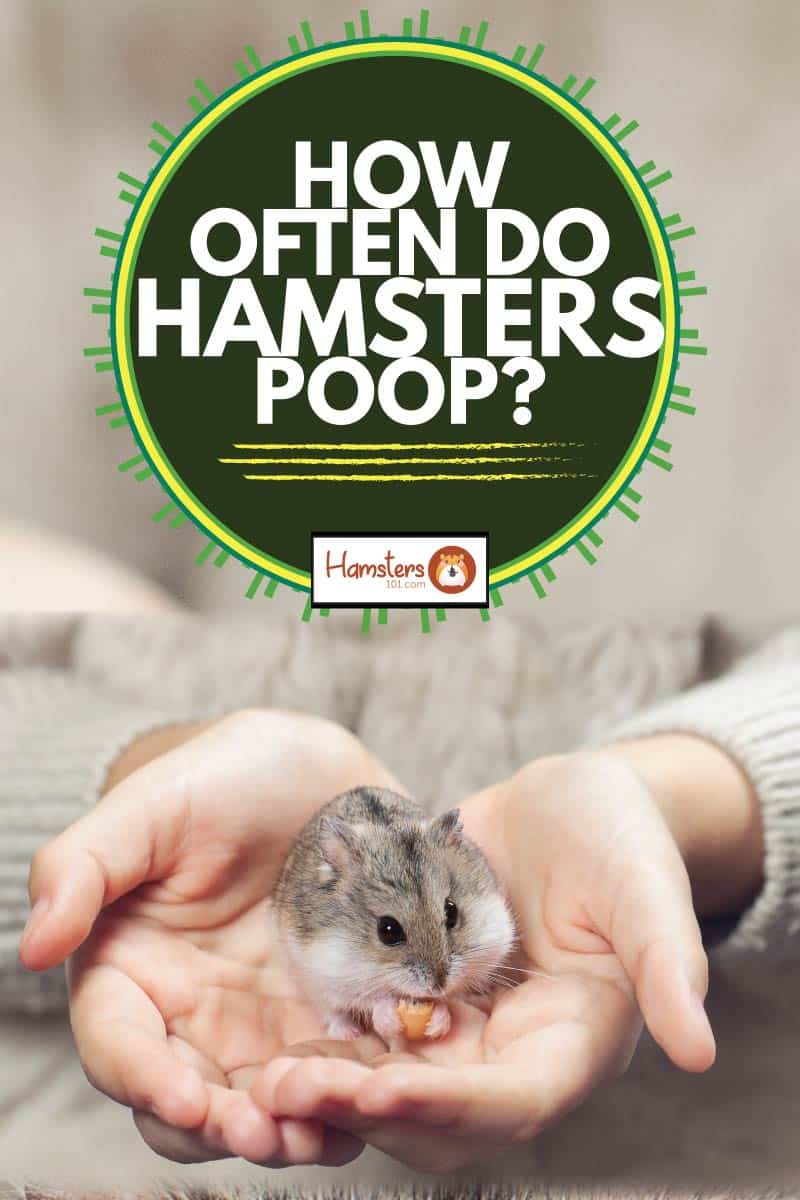
Factors That Affect A Hamster's Bowel Movements
Even though it seems gross, monitoring your hamster's pooping habits is important for making sure your hamster is healthy. Any irregularities could mean that your hamster is sick. Let's break down the three factors that affect a hamster's bowel movement. Knowing these things will give you a better idea of how best to care for your furry friend.
Diet
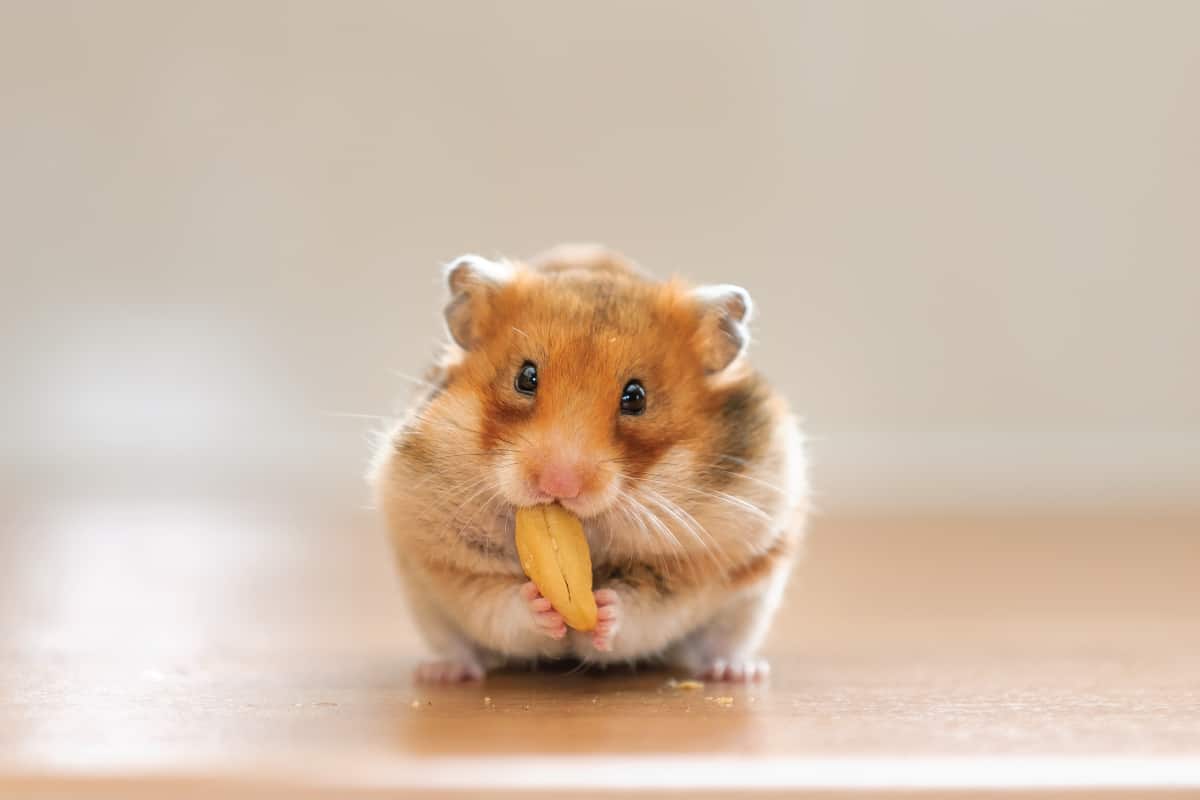
Hamsters are omnivores, meaning they eat both plants and animals. A normal diet for them could consist of seeds, flowers, grasses, nuts, and occasionally small treats such as mealworms and pieces of boiled egg. However, their main food source is fruits and vegetables.
Fruits and vegetables have the same effect on a hamster's digestive system that they have on a human's. But because hamsters have a fast-working digestive system due to their small size, they poop a lot more frequently. It's usually several times per day or even once every hour. Changing their diet can change their pooping habits.
Stress
A new hamster may poop a lot due to being in a new and unfamiliar environment, especially if the hamster is young. Even older hamsters may feel stressed and poop more if they're transferred to a new cage. The hamster may feel scared, but once it becomes familiar with its new home and settles down, it will poop less.
Another stress factor for hamsters is other pets in the house that may view the hamsters as prey. For example, a cat may see the hamster as food or a plaything and try to get the hamster, causing the hamster to feel scared and poop as a result.
Age
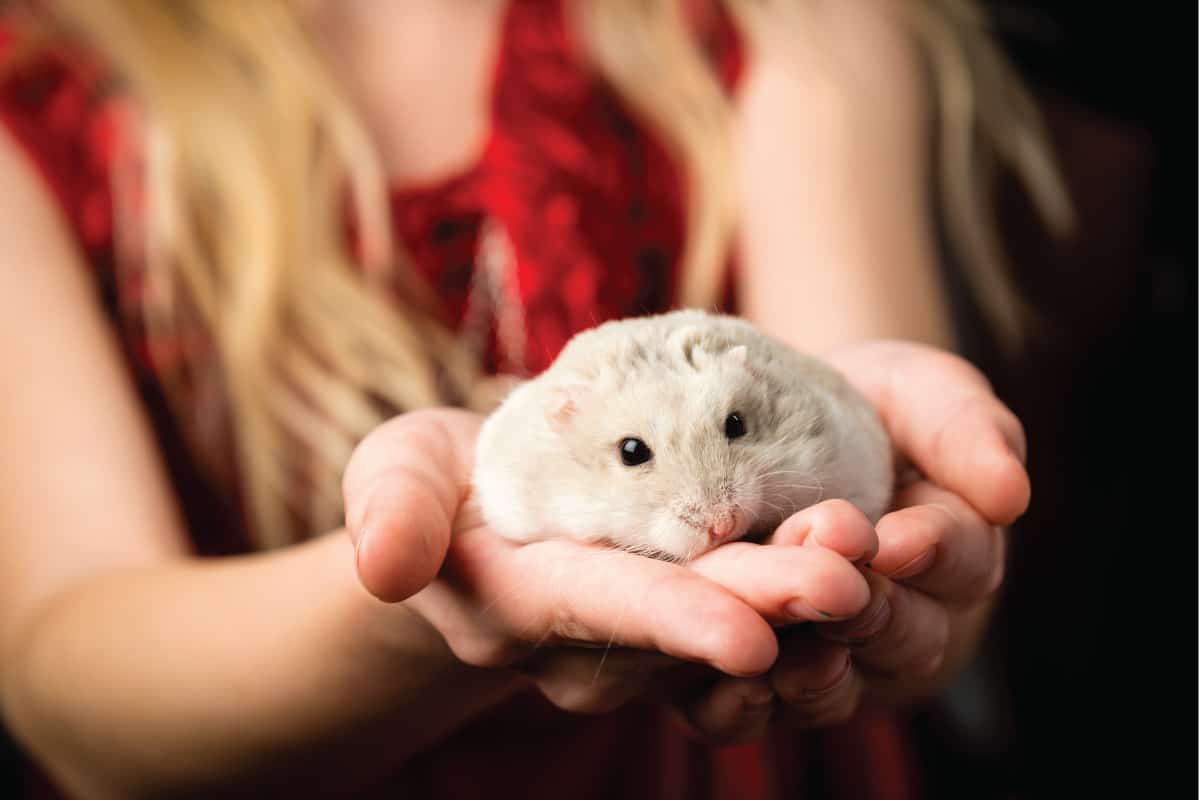
Younger hamsters poop more than older ones. As hamsters age, their diet may change. They may not enjoy the same foods that they used to eat. Or they may just eat less food. Both of these can affect a hamster's pooping habits, making them poop less than they did before.
A hamster's digestive system can also slow down during old age. A slower digestive system means less poop because it takes longer for the food to move through the hamster's body. This usually only happens near the end of a hamster's life. If you notice a younger hamster pooping less than normal, it could be a sign that your hamster is sick.
What Does Hamster Poop Look Like?
Healthy hamster poop will look like pellets and will be small, firm, and brown or dark-colored. Sometimes hamster poop will be lighter in color, softer, and runny. These are signs that your hamster may have diarrhea, which could just be a result of getting too many fresh fruits and vegetables. A temporary diet change may be necessary.
If changing your hamster's diet or adding fewer fruits or vegetables doesn't help clear up diarrhea, it could be a sign that your hamster has a more serious health problem and you should consult a veterinarian.
Is Hamster Poop Harmful To Humans?

Hamsters are known for being low-risk for transmitting diseases to humans through poop or other means. But sometimes hamsters can have bad bacteria such as Salmonella or e. Coli in their poop. Fortunately, there are things you can do to keep your hamster free of harmful bacteria:
Make Sure Your Hamster's Cage Is Kept Clean
Cleaning your hamster's cage regularly is important for making sure harmful bacteria are not able to be transmitted to your hamster or to you from contaminated food or poop. We will talk about how often you should clean your hamster's cage later in the post.
Prevent Contact With Other Animals
If your hamster comes out of his cage, make sure you have an exercise ball to contain it so that it is not exposed to other animals or contaminants. You should also make sure that any openings to the cage are secure so that your hamster cannot escape on its own.
Check out this hamster exercise ball on Amazon.
Wash Your Hands After Handling Your Hamster
Be sure to wash your hands thoroughly after playing with your hamster or cleaning its cage. Wear gloves if possible and avoid touching your face until after you've washed your hands to prevent transmitting harmful bacteria to yourself.
Do Hamsters Eat Their Poop?
Yes, hamsters eat their poop. When an animal eats its own poop, it is known as coprophagy. However, a hamster eating its own poop is normal behavior and is not a bad thing. It is actually a way to replace the good bacteria and nutrients that leave their bodies when they poop.
According to ScienceWorld, hamsters have good bacteria living in their intestines that aid in digestion. Digesting plant foods such as vegetables takes a lot of energy. The bacteria use their energy to help break down the plants so that the hamster's digestive system doesn't have to work as hard. Some of the bacteria then get expelled through poop.
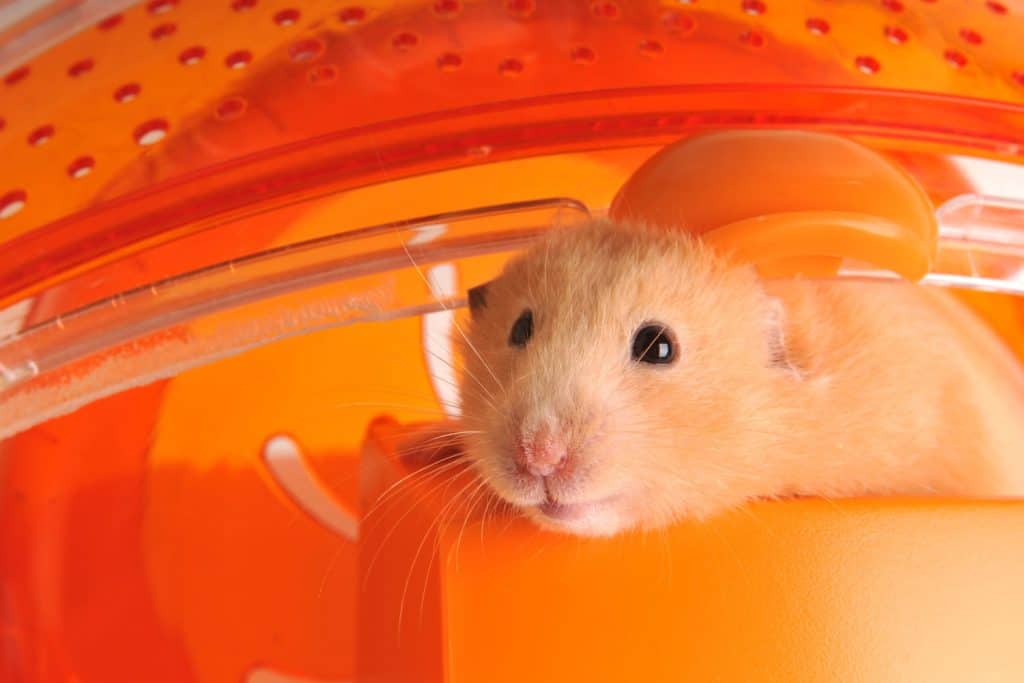
Hamsters then eat their poop so that the bacteria that left their body returns to their intestines. They also get back any nutrients that weren't absorbed the first time their food was digested and use those nutrients to create more energy.
Can You Litter Train A Hamster?
It is certainly possible to litter train a hamster. Hamsters can be trained to poop and pee in one spot, making it easier for you when you clean their cage. Litter training a hamster also helps the cage to be less smelly.
You can make your own hamster litter box by cutting a 3-inch hole in one side of a cardboard container. Make sure the hole is above the base of the container to prevent litter from spreading through the cage. You can also buy hamster litter boxes at most pet stores or on Amazon.
Check out this hamster litter box on Amazon.
Store-bought hamster potties usually come with litter, but you will need to replace the litter frequently. If you can't find hamster litter, you can buy unscented clumping cat litter or pellet litter made of wood, paper, or hay.
How Do You Litter Train Your Hamster?
Once you've gotten your litter box and litter, follow these steps to litter train your hamster:
- Cover the bottom of the litter box with litter.
- Add bedding that your hamster has already pooped on.
- Put your hamster near the litter box so he can sniff it, but do not force him to use it.
Keep in mind that it could take some time. If your hamster doesn't want to use the litter box for pooping, make sure the hamster has plenty of room to eat and sleep so that it isn't using the litter for those reasons instead. If the cage is too large and the hamster is pooping in more than one place, consider adding a litter box to each corner until your hamster starts using them regularly.
How Often Should You Clean Out Your Hamster's Cage?
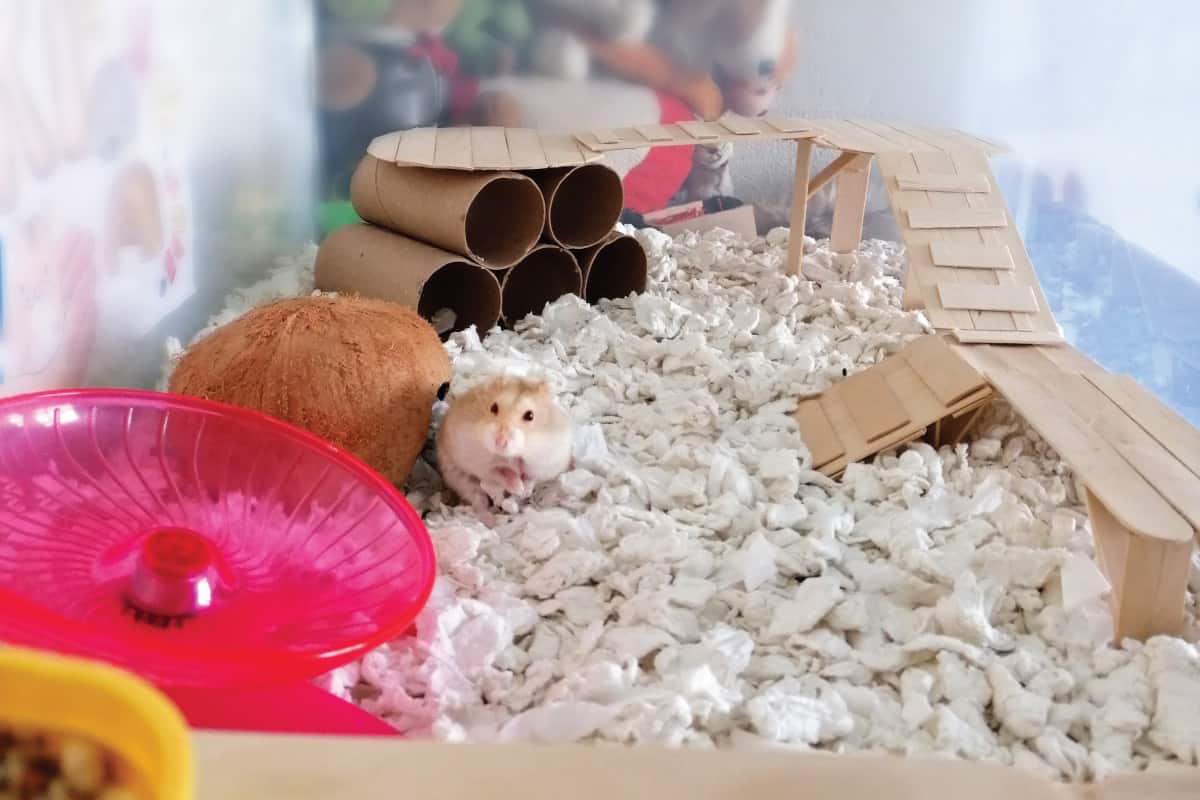
When cleaning a hamster's cage, there are things you need to do daily, weekly, and monthly. Follow these guidelines from Petco to help keep your hamster happy and healthy:
- Scoop out litter or soiled bedding every day.
- Clean food dishes and water bottles every day.
- Change out bedding once a week.
- Clean the entire cage once a month.
When cleaning the entire cage, be sure to place your hamster in a safe location such as an exercise ball or small pet carrier. Clean all accessories and toys with warm, soapy water and rinse it off thoroughly. Let the cage and accessories dry before adding new bedding.
Pooping A Lot Is Normal!
Hamsters poop a lot because they eat a lot and are so small. Just remember to clean the cage regularly and pay attention to your pet's pooping habits to make sure that everything looks like it should. Now that you know what's normal for hamster poop and when you should seek veterinary care, you are on your way to being a happy hamster owner!
Before you go, be sure to check out these other insightful hamster articles:




![A cute little hamster lying inside his pink cage, Can You Take A Hamster On A Plane? [And How To]](https://hamsters101.com/wp-content/uploads/2021/08/A-cute-little-hamster-lying-inside-his-pink-cage-300x200.jpg)

Are girl hamsters common to eat other hamsters if put out together or in the same cage?